SEO: What is a Zero-Click Search? (And Why Should You Care?)
Reading Time: 5 min
You meticulously craft the perfect blog post, optimise it for every keyword under the sun, and eagerly await the traffic surge. But what if people find their answers without ever clicking through to your site? This is the reality of “zero-click searches,” a growing phenomenon reshaping the SEO landscape. In this article, we will demystify zero-click searches, explore their impact on website traffic and SEO, and equip you with SEO strategies to adapt and thrive in this evolving search environment.
What is Zero-Click Search?
Zero-click searches occur when a user enters a query on a search engine like Google or Bing and finds the desired information directly on the search engine results page (SERP) without clicking on any website links. Common examples of zero-click search results include weather updates, time conversions, and mathematical formulas.
For instance, a search for “weather in Hong Kong” would likely result in Google displaying a complete weather forecast directly at the top of the SERP, including temperature, humidity, and precipitation probability. While undeniably convenient for the user, this direct answer eliminates the need to click through to a dedicated weather website, potentially costing those sites valuable traffic.
Recent research by SparkToro indicates that 6 out of 10 Google searches now result in users finding their answers directly on the SERP, highlighting the increasing prevalence of zero-click searches and their impact on user behaviour.
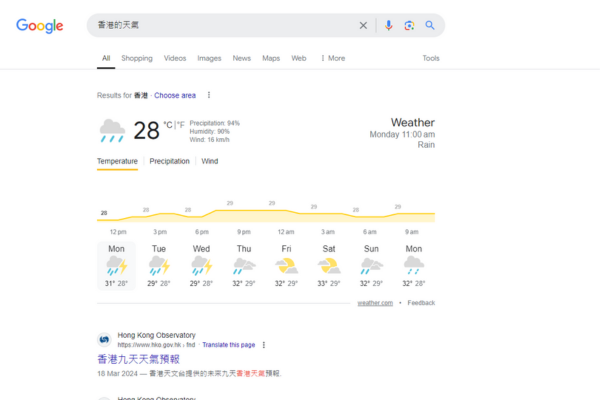
The Impact of Zero-Click Searches on SEO
Zero-click searches present a significant challenge to traditional SEO strategies, impacting website owners and SEO professionals.
Firstly, zero-click searches inherently reduce website traffic by giving users direct answers on the Search Engine Results Page (SERP). Users no longer need to click through websites to find the information they seek.
Secondly, Google’s introduction of features like Featured Snippets and Direct Answer Boxes often pushes even top-ranking websites further down the SERP. This decline in prominence can significantly impact a website’s visibility and click-through rates.
However, this shift may also present a valuable opportunity to rethink SEO strategies. Being featured in a snippet or knowledge panel can significantly boost brand authority and user trust. As a result, optimising content to become Google’s go-to source for direct answers is now a crucial SEO frontier.
Explore Further: What is Generative Engine Optimisation (GEO)
Common Types of Zero-Click Searches
Google’s search results page displays zero-click search results in increasingly diverse ways. Here are some of the most common types:
Featured Snippets
Often referred to as “position zero,” Featured Snippets highlight the most relevant content from a webpage at the top of the SERP. These snippets typically include concise text summaries, lists, or even videos, providing users with immediate answers.
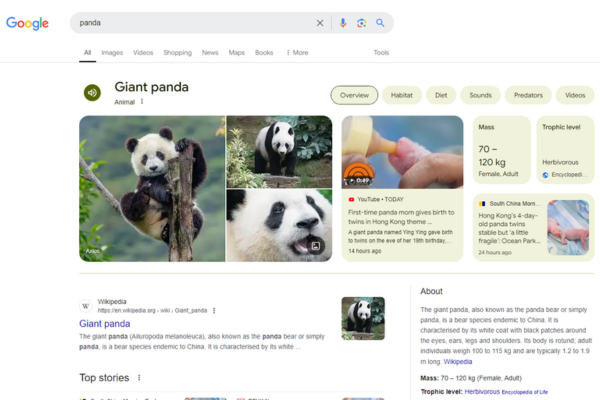
AI Overview
Leveraging AI technology, Google generates concise and informative summaries by synthesising information from multiple websites. These overviews appear prominently at the top of the Google SERP.
Explore Further: Latest AI Trends by LinkedIn
Direct Answer Boxes
For straightforward queries like “What day is it today?” or “What time is it in Hong Kong?” Google displays the answer directly on the search results page.
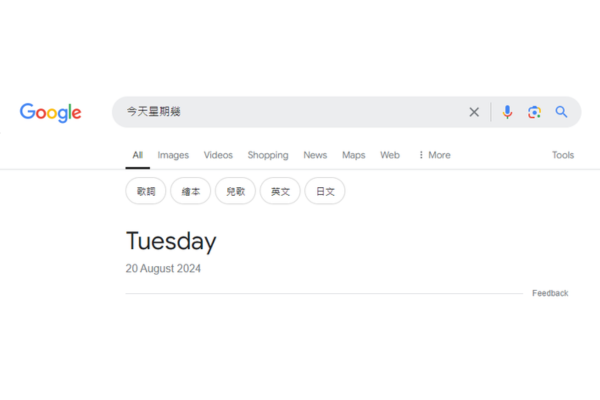
Knowledge Panels
When users search for specific people, places, organisations, or things, Google presents a Knowledge Panel on the right side of the SERP. These panels contain relevant information like summaries, images, and website links.
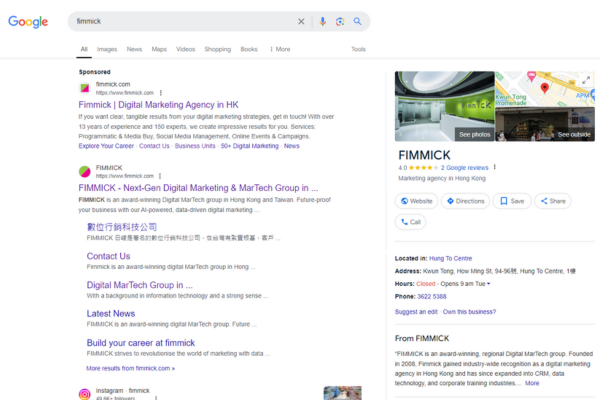
Local Packs
For location-based searches such as “restaurants near me” or “hotels in Hong Kong,” Google displays a Local Pack. This box features a map, business names, ratings, addresses, and other relevant details.
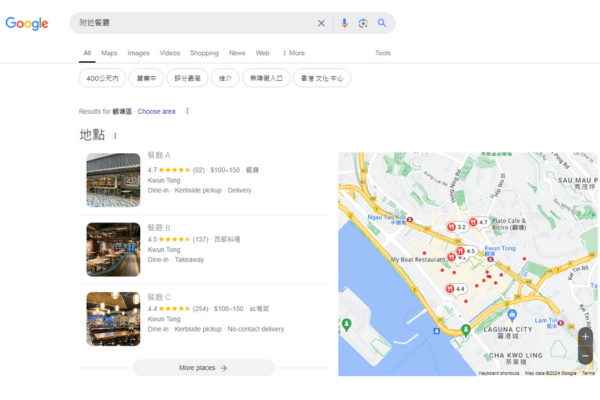
People Also Ask
Based on the user’s initial search query, Google suggests a series of related questions and brief answers. This feature encourages users to explore additional information and delve deeper into the topic.
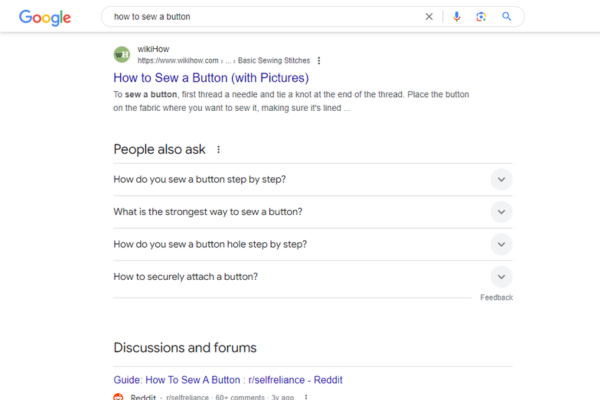
Adapting Your SEO Strategy for Zero-Click Searches
Given the rise of zero-click searches, how can we adjust our SEO strategies to secure greater visibility on the search engine results page (SERP)?
Strategic Keyword Selection
Google tailors its search results based on the specific keywords used. For example, searching for “FIMMICK” might prioritise our company profile, while searching for “red panda” might prioritise video results. Therefore, selecting relevant keywords and publishing corresponding content types is crucial for achieving optimal rankings.
Leveraging Long-Tail Keywords
Long-tail keywords are longer, more specific phrases with lower search volumes but often higher conversion rates. Optimising for these keywords can increase your chances of securing Featured Snippets or Direct Answer Boxes.
Enhancing Content Readability
Using concise sentences and paragraphs, clear headings, bullet points, and visuals makes it easier for search engines to understand and rank your content. This, in turn, improves your chances of appearing in Featured Snippets.
Creating User-Focused Content
Consider your target audience’s needs, pain points, and challenges. By providing valuable, easy-to-understand, and solution-oriented content, you can entice users to click through to your website rather than settling for zero-click results.
Explore Further: What is People-first Content
Professional SEO Content Writing Services by FIMMICK
Whether you’re optimising for search engines or AI, one thing remains constant: high-quality content is the key to your brand’s success. At FIMMICK, our SEO content writing service, powered by cutting-edge AIGC technology, will give you the edge to stand out from the crowd. Tapping into real-time search trends for relevant keywords, we help you generate high-quality, SEO-optimised content at scale with AI, resulting in higher conversion and sales.
Ready to take your business to the next level? Contact us now!

Conclusion
The rise of zero-click searches emphasises the paramount importance of high-quality content and effective presentation. Rather than solely chasing clicks, SEO strategies must now prioritise maximising visibility and impact within the search results. Regardless of how the search evolves, providing value and building trust remain cornerstones of brand success.
Related Solutions
Related Articles

Content Marketing: Social Media in Travel – Key Trends for 2025
Is your travel marketing ready for 2025? Explore the evolving landscape of social media and its impact on the travel industry.

AI: AI Generated Content on Meta: Will it Reshape Social Media Feeds
Meta’s using AIGC to reshape Facebook and Instagram. Learn how brands can adapt and thrive in this new AI-driven landscape.

Content Marketing: Social Media Engagement Loops – The Key to Drive Customers
Discover how to integrate engagement loops into your social media marketing plan and turn passive followers into active, paying customers.









